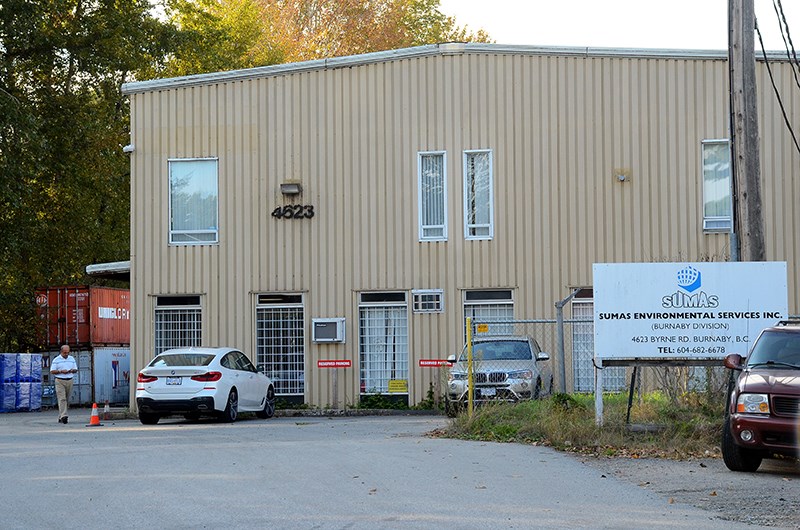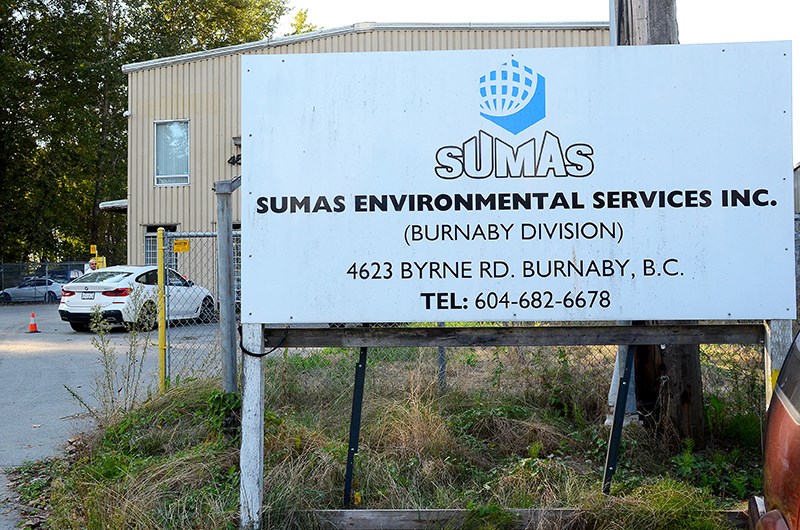A Burnaby waste-management company could face a $10,000 Environment Ministry fine for failing to register hazardous waste at its facility, according to a recent court ruling.
Sumas Environmental Services Inc. operates five waste-management facilities in B.C. and Alberta.
Its Burnaby operation in the Big Bend area is permitted by the B.C. Ministry of Environment and Climate Change Strategy to receive and process hazardous waste, including waste oil and contaminated soil and water, as well as every kind of TDG (transportation of dangerous goods) classification except explosives, according to the company’s website.
(That means flammable liquids, flammable solids, oxidizing substances, toxic and infectious substances, radioactive materials, corrosive substances and miscellaneous products, substances and organisms.)
But the ministry says the company’s permit, obtained in 1998 under old legislation, is no longer valid, according to a B.C. Supreme Court ruling Friday.

The ministry sent the company a warning letter last December, requesting Sumas immediately correct its non-compliance.
Current legislation requires anyone storing or producing certain quantities of hazardous waste to register them by filling out forms itemizing the kind of waste, the source, the quantity and how it’s being handled.
Sumas has failed to do so, according to the ministry, and is therefore violating the Environmental Management Act.
The ministry letter warned of “escalating enforcement action” if Sumas didn’t take the necessary steps to get into compliance.
Sumas, however, is arguing it is still entitled to carry on operations under its old permit as is.
It applied to the Environmental Appeal Board, but that body dismissed the appeal on jurisdictional grounds.
Sumas then petitioned B.C. Supreme Court, to either quash the Environmental Appeal Board’s decision or to declare that Sumas’s permit for the operation of its facility is in good standing and remains in full force and effect.
In the meantime, however, the ministry sent Sumas another letter in July saying the company was still operating the facility without valid authorization and the matter was “being referred for an administrative penalty.”
According to court documents, the penalty being considered was $10,000, but notice of the penalty was never officially sent to Sumas.
The company has nonetheless made two applications asking the court to stay the administrative penalty and issue interim orders to prevent the ministry from taking any further action until the petition is heard.
It also asked the court for an order to prevent the ministry from posting the penalty assessment on the internet.
In a ruling Friday, Justice Geoffrey B. Gomery dismissed Sumas’s most recent application as premature since the penalty assessment has not actually been issued.
“There is no administrative penalty assessment to stay,” Gomery wrote.
He also said there was little risk the ministry would post information about a possible penalty assessment on the internet before actually issuing it.
Nearly 70 people are employed at Sumas’s Burnaby facility, according to president and owner Saeed Javadi.
He told the NOW the dispute is only a matter of paperwork, and the ministry knows what’s coming in and going out of the facility through transportation manifests.
He said filling out the missing forms would constitute an entirely new application, which the ministry could reject, and the company shouldn’t have to do that, since it had a valid permit when the legislation changed.
“We want them to recognize our old permit and then say ‘OK, you need to do these extra things.’ We’re fine with that, but we don’t want them to rescind our old permit, ask us to make a new application,” Javadi said.
A government media relations staffer told the NOW ministry officials couldn’t comment on the case because it is before the courts.



